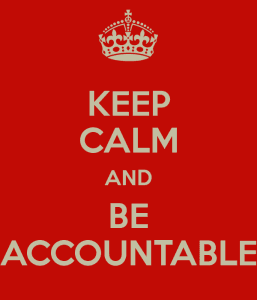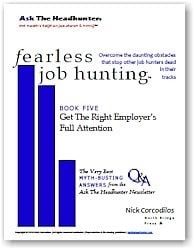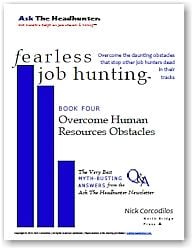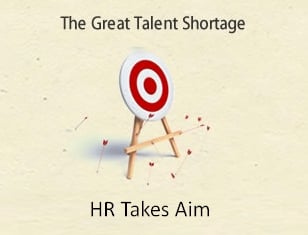Question
I’m in the final phase of getting a job offer I really want. They already told me what the offer is, but they need to check my references before they deliver it in writing. I know my professional references are good but how do I really know what a former boss or colleague is going to say? Your advice will affect whose names I give out. Thanks.
Nick’s Reply
You know what your references will say by controlling it in advance. You’d never go to a job interview without being prepared. So, why would you let your references talk to an employer without preparing them?
Having checked thousands of references — always on the phone, never via e-mail — I’ve found that most are bleah at best. A bad reference is rare and a superlative reference is uncommon. But without a lot of prompting from me, a candidate’s references usually have little to say. They’re unprepared.
How your professional references can hurt you
This is bad for two reasons. First, an unprepared reference comes off as unenthusiastic. Enthusiasm about the candidate in question is paramount in a reference check. An awful lot of insight and information about a candidate is folded into the way their references speak about them.
Second, uninspiring comments about a candidate can count against them; for example, if other problems arise with your candidacy, there needs to be some countervailing fervor. If a reference can’t speak enthusiastically about the candidate, I’ll go with a candidate whose references can.
Here’s the tragedy. People get rated #2 or #3 in highly competitive interviews not because they lack necessary qualities, but because their references aren’t prepared to deliver clear, compelling opinions about them.
Control what your references will say about you
Don’t lose a job offer because of your references. To pull this off, you must select professional references that will launch you into the new job you want. How do you choose whose names to submit? Well, you need to know what they’re going to say, right?
What if an employer wants your references to fill out online forms or to talk to a robot, rather than take a call? See Before you risk your references.
I’m going to offer a few observations and suggestions about how to control — yes, control — your references. I don’t mean manipulate; I mean prepare them to deliver opinions and comments that will make an employer want to hire you. There is nothing dishonest or underhanded about this. We’re going to exploit some simple laws of psychology. We’re going to prepare your references to do their best for you.
How to prepare your professional references
1. Call them
When you need a former boss or co-worker to step up and deliver a warm, enthusiastic endorsement for you, don’t make the request via e-mail. Make your request just as warm and personal. Use the phone. This is critical because only a conversation will enable you to control what they say. Of course, you must start by asking if they’d be willing to give you a reference. If they agree, tell them who is going to call, and very briefly outline the job you want.
2. Help them remember
When an employer calls, most references are taken by surprise. They’re in the middle of something else. They’re not thinking about you and your time working together. That’s why you need to call them first, to remind them what made you a great employee and to prepare them about the job you want. (If you have a solid relationship with the person, this is where you can disclose what you’re doing. “To be frank, I know how busy you are. I figured that recapping our work together might help with the reference call.”)
3. Say it out loud
Here’s a fun fact from the world of cognitive psychology: People remember better when they write something down or say it out loud first. More important, in this case, is that people also tend to repeat what they’ve already said or heard. So, when you ask your former co-worker or boss to serve as a reference, recount your past experiences together out loud. Trust me: They are then likely to parrot the words from your conversation to the employer that calls them. This is how you’ll know in advance what they are most likely to say.
4. Recount successes
Ask if they remember a successful project you worked on together. Say this: “I know we faced some challenges, but I’m proud of how we did X, Y and Z.” Ask what they remember about it. Guide your discussion so they will recount out loud (a) what your contribution was, (b) how you did it, and (c) how it paid off. Let them say it so they can hear it.
5. Map skills
Briefly suggest which of your skills (that were so valuable to your old employer) will map onto the new job you want, and how they will pay off to the new employer. Then…
6. Ask for advice and insight
Briefly describe the challenges of the new job. Ask your colleague’s advice about which of your skills might contribute to your success. Ask how they suggest you should approach it.
7. What did you do best?
Help the colleague express out loud what you did best at your old job.
8. What would make you a better worker?
Ask this: “If you could give my new boss some advice about how to help me perform better, what would you say?” (This is a subtle way of influencing the answer to the infamous reference checker’s question, “What are this person’s weaknesses?”)
Prepare your professional references
As we’ve said, you prepare for your job interviews, so prepare your references for a reference call. People parrot what they hear. Help your references parrot themselves. Gently make them say it. Helping them say it out loud to you helps them remember it for the reference call.
Don’t expect to do everything I’ve suggested! Just what you’re most comfortable with and what there’s time for. And of course, there is no guarantee any of this will work — but it’s the best way I know to have some measure of control over your references. Don’t forget to thank your reference for their kind help, for taking a trip down memory lane, and for taking time to speak with who you hope will be your next employer.
Finally, say this: “If I can ever return the favor, don’t hesitate to call me.”
Objections?
Now I’ll try to anticipate a couple of objections you may have:
“I don’t feel comfortable doing this.”
Then why submit the person as a reference? Please think about it. If a former colleague is not likely to take a few minutes to discuss your experiences working together, do you really think they’ll help you get hired?
“I don’t have any references I know well enough to do what you suggest!”
This is a wake-up call. Start cultivating colleagues now, so you can count on their references in the future!
Do you have references you can count on? How did you cultivate them? How do you avoid awkwardness when requesting a reference? Has a reference ever torpedoed a job opportunity for you? Has a reference ever clearly tipped the scales to help you get hired? What tips would you add to the list above?
: :




 If a person has been fired from their job, does a prospective new employer have the right to contact the old employer and ask the reason for the end of employment? I’ve heard previous employers can only state the dates of employment, compensation, and nothing else, but wasn’t sure if that was really true. This is assuming the firing is for general performance reasons and nothing egregious or illegal (something like embezzlement, drugs, or violence). Thank you.
If a person has been fired from their job, does a prospective new employer have the right to contact the old employer and ask the reason for the end of employment? I’ve heard previous employers can only state the dates of employment, compensation, and nothing else, but wasn’t sure if that was really true. This is assuming the firing is for general performance reasons and nothing egregious or illegal (something like embezzlement, drugs, or violence). Thank you. I work in Human Resources (HR). During our on-boarding process, we send prospective employees for a drug screen and run a background investigation and, if the job requires driving, a motor vehicle record (MVR) check. The background is launched when the applicant electronically completes an authorization.
I work in Human Resources (HR). During our on-boarding process, we send prospective employees for a drug screen and run a background investigation and, if the job requires driving, a motor vehicle record (MVR) check. The background is launched when the applicant electronically completes an authorization.





